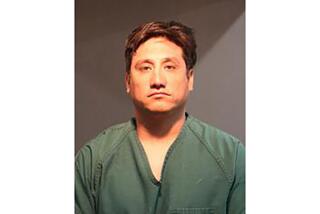Court Upholds Former Oceanside Teacher’s Rape Conviction
- Share via
A former Oceanside High School history teacher convicted of having sex with a student was properly found guilty of statutory rape, a state appellate court in San Diego ruled Monday.
Leonard Palos de la Rosa, 34, has no legal grounds for a reversal of his convictions on two counts of statutory rape and four counts of molesting a girl who, as a sophomore, was a student in his Western civilization class at the school, the 4th District Court of Appeal ruled.
Despite the court’s action, de la Rosa already has been released from state prison, one of his defense lawyers said. He already has fully served his sentence in the case, attorney Richard D. Muir said.
“It was a sad case all around,” Muir said. “Leonard was a good teacher.”
De la Rosa, who had taught at Oceanside High School for nine years, was convicted in Vista Superior Court in January, 1989, of having sex with the girl when she was 16.
The two had written each other notes that were kept in a file cabinet in his classroom, Judge Charles W. Froehlich Jr. said.
The judge said De la Rosa’s first note included this passage: “I can still feel the softness of your skin and the fresh fragrance of your hair, your great smile. See you at break.”
He said the girl’s response was, in part: “I look forward to every minute I am able to spend with you. Being with you makes my life complete. You are my morning star of tomorrows. . . . “
In November, 1987, De la Rosa and the girl had sex twice, both times after driving to Mt. Soledad, the judge said.
After the second occasion, the girl stopped going out with De la Rosa because her mother wanted her to stop seeing him, Froehlich said. Meanwhile, the girl told a friend about the sexual relationship with De la Rosa, and the friend told another teacher, who told school officials, who called police, Froehlich said.
De la Rosa admitted that he was a friend of the girl but denied having sex with her, Froehlich said.
After he was convicted and sentenced to two years in state prison, De la Rosa contended that his constitutional rights were violated at the trial when prosecutors played part of a taped telephone call the teen-age girl had made to him.
The call had been made at the suggestion of police officers, who secretly recorded it, Froehlich said.
During the call, De la Rosa did not deny their sexual relationship but tried to persuade the girl to retract various statements to officers, Froehlich said.
Though the recording was made in secret, that did not make it illegal, Froehlich said.
The constitutional guarantee against self-incrimination applies only when police ask questions of a person in custody, Froehlich said. Since de la Rosa was only a suspect but not under arrest when the call was made, his rights were not violated, Froehlich said.
More to Read
Sign up for Essential California
The most important California stories and recommendations in your inbox every morning.
You may occasionally receive promotional content from the Los Angeles Times.













